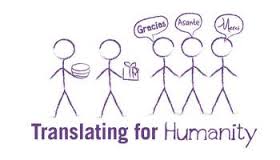With the ongoing changes and shifts in groups of population in various countries in the world due to immigration and migration, the impact of spoken languages is enormous.
Children in migrant families also need to deal with learning new languages, especially in situations when outside the comfort of their homes.
After settling in a new country, at some point the children in a migrant family need to go to school. Sometimes that brings along communication difficulties when the family members are less proficient in English or the adoptive country’s language.
I would like to refer to a study done by the Nuffield Foundation in the UK, that looks into the role of children and adults acting as ‘language brokers’ in conversations between pupils, parents and school staff. They are not interpreters, as they are not professionals with a certificate or degree in T&I, but they take on the role as an interpreter as they are trying to ensure effective communication. This role is often performed by children, as mostly they learn a host language much more quickly than their parents. It maybe preferable or unavoidable in some cases to have children perform as an interpreter, but to avoid misunderstanding and mistakes during such an important adult conversation, it might be wise to turn to a professional.
Parents need to be involved in their child’s education. Openness and clarity are important in understanding which level the child has reached, how the child is performing academically, which issues need attention and what both the parents and the teacher can do to help. Communication is essential, so in certain cases an interpreter, if available, might be necessary. A professional interpreter is trained to be impartial during these conversations, so both sides can build trust when discussing opinions, feedback and suggestions regarding the student’s school career. With an interpreter on site, discussions between school staff and parents will develop more fluently and this eases the process of the student adapting to the new school surroundings.
The requirement for an interpreter in a school occurs whenever the parents or students interact with school staff who don’t speak a shared language. The interpreter can overcome language barriers between parents and educators.
Here are some examples of when interpreting is useful in a school:
-parent-teacher meetings regarding enrolment, school reports or educational assessments
-providing a student or pupil with access to a school’s general curriculum
-providing information about specific school programmes
-assisting during school assemblies
-assisting during school lectures
-counselling sessions
Nowadays, many refugees are trying to build a life in their adoptive country. Once settled in, their children need education.
Agencies serving refugees or immigrants that assist children with communicating in school, need interpreters or translators. In most cases, it is not clear whether T&I services are provided within public schools.
The following site is very useful for some detailed information on the role of an interpreter in schools in the USA:
ftp://help.isbe.net/webapps/Spec_ed/BMChapter6-7-12.pdf
Interpreters interviewing recently arrived refugee or immigrant parents and children, need sufficient time to prepare. These meetings can be quite sensitive. Besides educational topics, also (mental) health issues might be part of the conversation.
A good resource for information on interviewing refugees can be found on the website of BRYCS:
http://www.brycs.org/documents/upload/BRYCSBrief-Interviewing-Winter2009.pdf
Looking at the actual migrant situation in Europe, my guess is that interpreters will soon be very much needed in schools there.

























